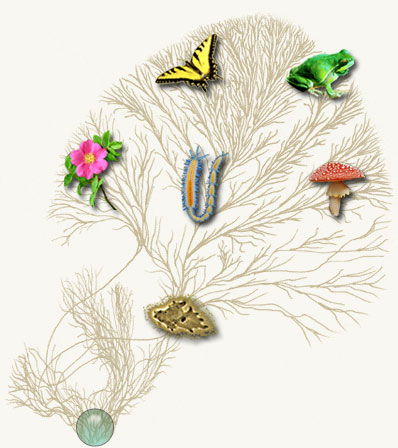Serendip is an independent site partnering with faculty at multiple colleges and universities around the world. Happy exploring!
Reading Images, Imagining Forms
II. Reading another...
III. Let's turn to words...
Thinking together about "genre"
from the Oxford English Dictionary:
[a. OF. gen(d)re (F. genre) =
Sp. and Pg. genero, It. genere,
ad. L. gener- stem form of genus race, kind =
Gr.![]()
![]()
![]()
![]()
![]() , Skr. jánas:
, Skr. jánas:![]() OAryan *genes-,
OAryan *genes-,
f. root ![]()
![]()
![]() - to produce; cf. KIN.]
- to produce; cf. KIN.]
![]() 1. Kind, sort, class; also, genus as opposed to species.
1. Kind, sort, class; also, genus as opposed to species.
the general gender: the common sort (of people). Obs.
But what is the genre of character..which, if in true keeping to life and manners,
should not be found to resemble any body?
1840 T. MOORE Mem. (1856) VII. 273
Two very remarkable men..but of entirely different genres.
GENS
A clan or sect; a number of families united by the ties of a supposed
common origin, a common name, and common religious rites. Hence
employed to designate any similar aggregation of families.
so let's do some sorting. We could start w/ Darwin's Tree of Life...

but let's start instead w/ ourselves:
begin w/ introductions:
(re-) name yourself and
3 words (noun or adj.) that you use to identify yourself:
attributes that are imp't to you, and that you are
comfortable using
break into groups, and go up one level of abstraction--
what are the kinds of categories that we used to name
ourselves?
draw a site map on board, naming the categories and identifying the entries inside them
that make sense of our identities in relation to one another.

The Wagner Free Institute of Science
(See Taxonomy--Wikipedia
Taxonomy Lab: The "Nuts and Bolts" of Taxonomy and Classification
Bloom's Taxonomy: A Classification of Levels of Intellectual Behavior )
--what categories did we use/fail to use?
conventional 6: race (ethniticy)/class/gender/religion/sexual
orientation/disability
other categories more imp't than these?
why avoid some of these? (too imp't? too scary? too
obvious?)
what proportion of the categories are visible/invisible?
what proportion of the categories do we occupy
willingly/unwillingly?
what proportion are "natural," imposed?
what categories matter most,
when we discuss our identities and those of others?
--How many "kinds" do we constitute?
What are the grounds for our groupings?
(Identify any/all characteristics that seem important to you.)
Are the relationships among us best represented by a table, or a grid, or a tree...?
--What matters in the categories we make?
How do we construct them?
--How did we arrange them in relationship to one another?
(Are our taxonomies hierarchical? With sub/supertypes, parent-child
relationships,
satisying increasing numbers of constraints?
VI. Why'd we do this?
get you thinking/doing something experiential
remind you that you know quite a bit already, from your life
experience
that what you know is infinitely revisable, in exchange w/
others
and that there's been lots of interesting work done in these
areas,
where we can learn more....
For starters: categorization can begin
- "platonically": from the "top-down"--
a priori principles, catagories, into which we then put ourselves.
But how many categories can each of us occupy simultaneously?
If we were building a "science museum," how many rooms would feature you?
- "aristotle-ally": from the bottom-up--
from practice/ reports of what we observe about ourselves and ourselves,
which we then sort into categories.
But what is the causal relationship among the categories?
And how much are the categories "inside" determined by those "outside"?
VI. And what does all this have to do with GENRES?
- they exist at various levels of abstraction
- belong to discourse communities, not individuals
- involve a dance of sameness & difference/identification & division/
recognition & novelty
- are all about expectations (about how texts are read...)
Let's try again...
list the genres you know/like: what are the grounds of their distinctions?
review conventional generic divisions: what is the logic of their differences?
- lyric/drama/epic (narrative)
- poem/play/story/essay (fictional/non-fictional prose)
- romance/comedy/tragedy/satire (irony)
- romance/realism/naturalism
VII. The idea of the "administrative control" that
results from the ability to identify "kinds"--is the central argument of
Preface to The Order of Things:
An Archaeology of the Human Sciences, by Michel Foucault
(translation of Les Mots et les choses)
which begins with a meditation on the constructedness of categories:
This book first arose out of a passage in Borges, out of the laughter that shattered, as I read the passage, all the familiar landmarks of thought—our thought, the thought that bears the stamp of our age and our geography—breaking up all the ordered surfaces and all the planes with which we are accustomed to tame the wild profusion of existing things and continuing long afterwards to disturb and threaten with collapse our age-old definitions between the Same and the Other.
Jorge Luis Borges describes "a certain Chinese encyclopedia," the Celestial Emporium of Benevolent Knowledge, in which it is written that animals are divided into:
- those that belong to the Emperor,
- embalmed ones,
- those that are trained,
- suckling pigs,
- mermaids,
- fabulous ones,
- stray dogs,
- those included in the present classification,
- those that tremble as if they were mad,
- innumerable ones,
- those drawn with a very fine camelhair brush,
- others,
- those that have just broken a flower vase,
- those that from a long way off look like flies.
VIII. Plan for the semester....


